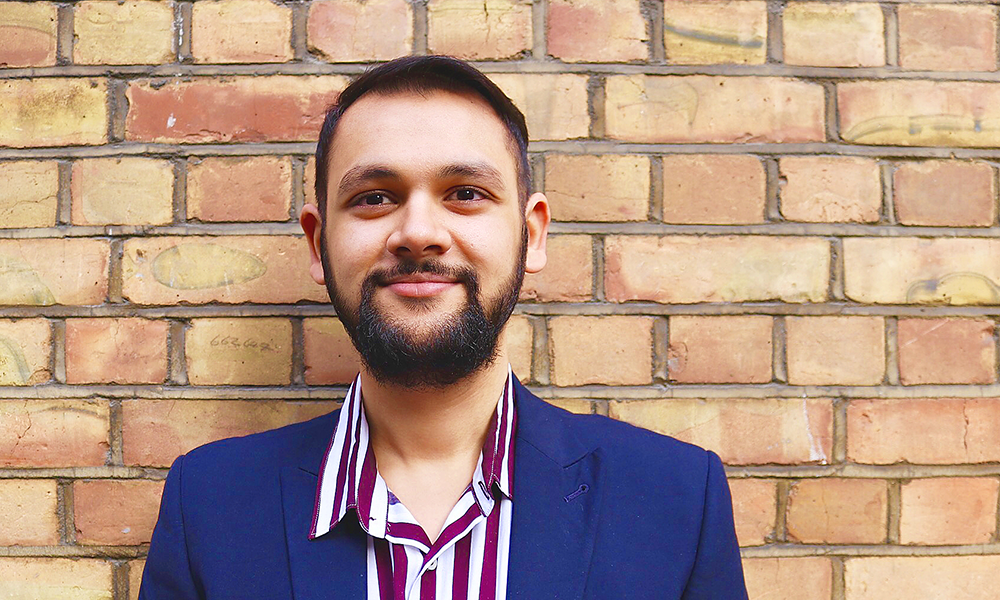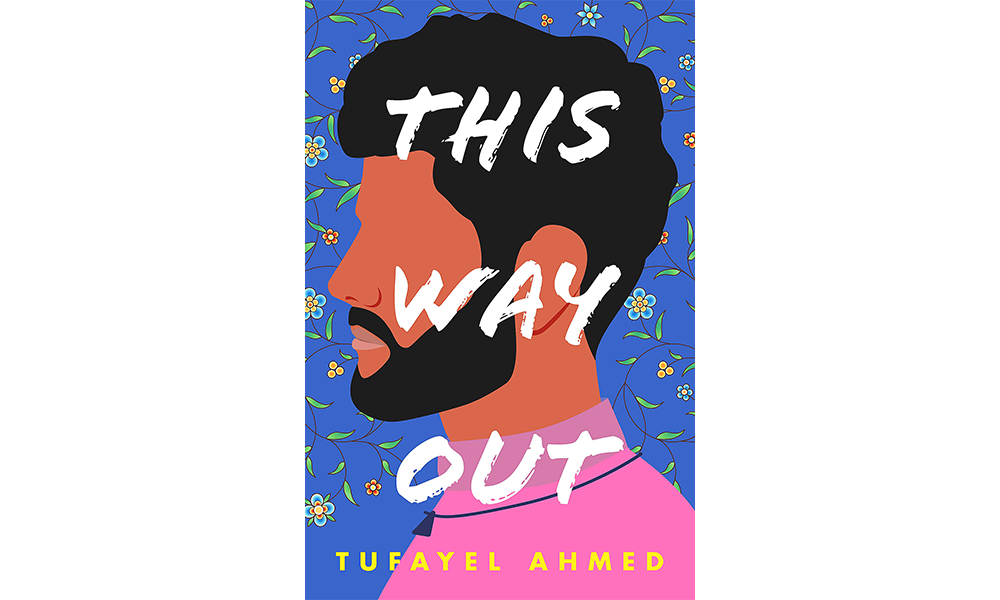Tower Hamlets-based journalist, editor and author tackles grief and coming out in his debut work

Subscribe to Wharf Life’s weekly newsletter here
Bow-based journalist, editor and author Tufayel Ahmed’s debut novel was published in July, 2022 – and to give readers a flavour, he’s kindly allowed Wharf Life to release an extract.
Based on his own experiences of living with grief and the South Asian and LGBTQIA+ communities in east London, This Way Out tells the story of Amar who finds love in the arms of Joshua.
There’s just one problem – he hasn’t told his strict Muslim Bangladeshi family that his partner is a man – and not a Muslim.
So, what better way to announce you’re getting married (and gay) than on your family’s WhatsApp Group?
The novel also tackles themes of loss, with Tufayel partly driven to write by the death of his mother after a long illness.
“In a lot of South Asian families, we aren’t taught to discuss or express feelings, so I didn’t really have a way to channel my grief,” Tufayel said.
“I ended up writing a similar story arc for Amar in the novel – he, too, is consumed by grief and falls into depression.
“Writing about his grief, putting my own feelings down on paper, was quite cathartic, and writing out the ways in which he might resolve his grief – such as therapy – was almost like a roadmap on how to deal with my own.
“I began seeing a therapist too, and between that and writing the novel, I really was able to, if not overcome grief, at least feel at peace with it.”
This Way Out is published by Lake Union and is priced at £8.99.
At the time of going to press it was available on offer with amazon.co.uk for £4.99 in paperback.

FROM THIS WAY OUT BY TUFAYEL AHMED
I haven’t been back home to Mileson Street for a few months. Not since last Eid. That was the last time the family were all together, huddled around the kitchen table eating korma and pilau.
The kids were running around the house, showing off their new presents, and Oli smeared chocolate on his pristine new jumper.
There is joy and electricity when we all reunite now that everyone is off in their own little worlds, with their own wives, husbands, children and households. I didn’t eat all day before arriving at Dad’s that Eid, saving myself for Mina’s lamb samosas and Shuli’s prawn bhuna.
“You’re going to pass out if you don’t eat,” Joshua had said, waving a piece of toast with Nutella in my face that morning.
Then he’d taken a mammoth bite of it right in front of me, teasing me with the irresistible crunch of a perfectly toasted slice of bread.
“I’m saving myself for later!” I cried out, standing firm. Eid is always a big affair in our family. Mina and Shuli usually split the cooking duties – whipping up industrial-sized batches of saffron-scented pilau with juicy, fall-off-the-bone pieces of chicken in it – and Amira always makes at least three different desserts.
This Eid she made extra-gooey chocolate brownies, a banoffee pie, homemade rasmalai, and mango lassi to wash it all down.
We feasted until we could barely move, rice and meat threatening to return the same way it went down. After our late lunch, we gathered in the living room for tea and dessert. I felt so noxiously full that even a bite of Amira’s banoffee pie would have tipped me over the edge.
“Do you remember when we were kids, shopping for Eid clothes in Green Street? One of you lot would always cry: ‘I don’t want to be dressed up like him’,” Mina said playfully, smiling at Asad as she basked in the memories. “You could never dress like your big brother: ‘He’s not cool!’
“Mum and Dad always had to make sure you two had different outfits. God forbid you matched. You were worse than us girls.”
“Well, he wasn’t cool,” Asad said, laughing at Abed. “He still isn’t. I had a reputation to uphold, okay?”
“Oh yeah, what’s that? As one of the bad boys of the estate?” Abed teased him back. “What was it you and your mates called yourselves? The Globe Town Krew? Yeah, you looked real hard tagging the side of the library!”
“Could never get your hair cut with him, either,” I said, joining in. “Remember his Beckham curtains? The barber had to spend an hour on them, and I’m just sitting there waiting for my No. 1 side and back.”
We all broke into laughter, reminiscing about the adventures of our youth – when our problems were trivial and life felt simple. As the evening wound on, the photo albums came out, as they always did when we got together.
Photos of Mina, Abed and Asad as children, posing with long-slaughtered cows during a holiday in Bangladesh, before Amira and I came along. Photos of the five of us dressed up in garish outfits at Mina’s wedding. The suit I’d worn was too big. The trouser legs were twice the width of my legs.
Abed, Asad and I all had all worn pinstripe black suits with hideous silver waistcoats. In our defence, it was the turn of the millennium and we were foolishly led to believe this was cutting edge.
“Amira, you were so chubby,” Mina said, pawing at a photo of Mum in hospital holding Amira just a day after she was born. Three-year-old me can be seen lying on her hospital bed, as if insisting I was still a baby, too.
“You two were the heaviest out of all of us!” Mina continued, looking between me and Amira in mock horror. “I don’t know how Mum did it.”
“Thankfully, not chubby any more!” Amira laughed, surreptitiously glancing over at Asad, who was starting to develop heft around his stomach, just like Dad.
“Oi, I’m not fat. I’m just big-boned!” he hit back.
The laughs continued well into the night, by which time we were ready for second helpings of food.
Still, there was more than enough for everyone to take home containers of leftovers, which I savoured for days after. No matter how much I try, I can never replicate the taste of home.
As I walk down Globe Road, cutting through the children’s playground near our street, I revel in my childhood memories. Mileson Street is the next left turn, a tucked-away, homely cul-de-sac only a five-minute walk from Whitechapel High Street.
No fewer than three blocks of flats stand in front of and behind our street, which is filled with modest three-storey semi-detached houses.
Before Amira and I were born, the family bounced around estates just like this all around east London. For a time they lived adjacent to Victoria Park, tales of which I listened to with envy as a child.
Then, when I came along, the council moved them into 18 Mileson Street – a real house, with a garden and a front lawn. Amira was next and the house was filled to capacity, but there was no need to move again.
As I turn the corner on to Mileson Street, I slow my pace to take in the old area. It looks much the same, and yet I feel like a stranger.
We were lucky to live on Mileson Street; despite the inner-city locale, high crime and poverty rates, our area always felt oddly safe and suburban. Everyone always looked out for each other.
It was like a mini Bangladeshi village at times, especially in summer, when kids from across the estate would play football or hopscotch in the streets carefree, only being wrangled into the house at sunset.
The road looks the same as always, but now the kids we used to play with have kids of their own. Sometimes I hear about so-and-so from one of my brothers, who still keep in touch with some of the boys from the neighbourhood.
But I never really formed the same friendships. For one thing, I didn’t like playing football every Saturday like they did. Also, I was never any good at football, so was never picked for any teams. The Spice Up Your Life dance routine, however, I knew inside out. I’ve taken the long way round, hoping that the walk will keep me calm, but as I get closer to the house, my stomach muscles tense.
Stopping, I lean against a wall adjacent to the street and call Joshua. I want to hear his reassuring voice one last time before I cross the threshold, before I meet my family face-to-face.
And maybe I will suggest he send out a search party if I don’t make it home tonight.
His phone rings several times. Each ring is shrill to my already ragged nerves. No sign of Joshua. I nearly give up, but then he finally answers and I sigh in relief.
“Hey,” Joshua says, his voice deep and calm.
“Hi…,” I reply a little shakily. “I’m here at my dad’s. Just getting ready to go in.’
“Oh.”
“Yeah. Oh.”
“I don’t want to say it’ll be fine because you’ll shout at me, so I’ll just say I love you.”
- I close my eyes and wish I could bottle up the comfort I find in his voice and take it inside the house with me. My heart swells in my chest. It is precisely what I need to hear right now
Read more: Discover David’s Play at The Space on the Isle Of Dogs
Read Wharf Life’s e-edition here
Subscribe to Wharf Life’s weekly newsletter here
- Jon Massey is co-founder and editorial director of Wharf Life and writes about a wide range of subjects in Canary Wharf, Docklands and east London - contact via jon.massey@wharf-life.com



